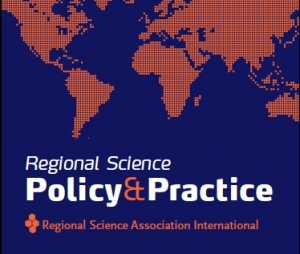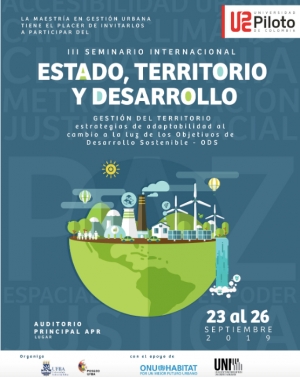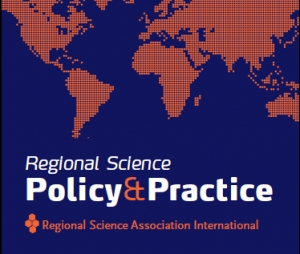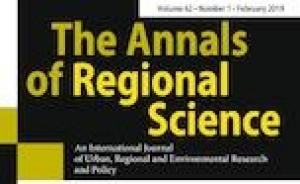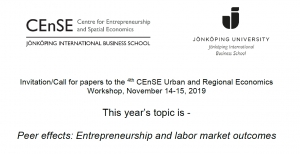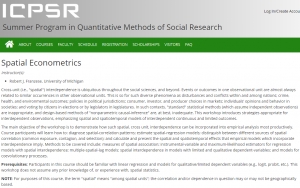Awards
Elisabete Martins
GEOINNO 2020 | 29th to 31st January 2020, Stavanger
ABOUT GEOINNO 2020
The University of Stavanger, in partnership with RUNIN, are organising the fifth Geography of Innovation Conference which will take place in Stavanger from 29th to 31st January 2020.
The Geography of Innovation Conference provides a forum for discussion to scholars interested in scientific, policy and strategic issues concerning the spatial dimension of innovation activities.
In line with the three previous editions of the conference, held in Saint Etienne (France) in 2012, Utrecht (Netherlands) in 2014, Toulouse (France) in 2016 and Barcelona (2018), the main objective of this event is to bring together some of the world’s leading scholars from a variety of disciplines ranging from economic geography and regional science, economics and management science, sociology and network theory, and political and planning sciences.
KEY DATES
Call for Special Sessions: May 3rd, 2019
Papers and Extended abstracts Submission: June 1st to August 31st, 2019
Acceptance Confirmation: October 1st, 2019
Registration Opens: October 1st, 2019
Registration Closes: November 24th, 2019
Congress Opens: January 29th, 2020
AESOP Newsletter 04/2019 - April 30
|
||||||||||||||||||||||||||||||||||||||||||||
|
RSPP Call for Paper | Special Issue on Regional development in Russia
RSPP Call for Paper
Regional Development in Russia
RSPP editorial board and Russian Regional Science Association invite scholars to contribute to a special issue to display contemporary research on Russian regions and urban areas.
The themes and topics of the contributions include, beyond others: economic transformation of the Russian regions; living conditions in the Russian regions; spatial justice between Russian regions; urban agglomeration; local and regional innovative systems in the Russia; Development of the Artic Regions.
Interested scholars are encouraged to submit an article in the platform of Regional Science Policy and Practice https://onlinelibrary.wiley.com/journal/17577802 until July 31, 2019. The papers will be on-line after accepted by a blind peer review process. The accepted paper will be compiled in a special issue on the fall of 2020.
Editors: Tomaz Dentinho This email address is being protected from spambots. You need JavaScript enabled to view it. and Alexander Pelyasov This email address is being protected from spambots. You need JavaScript enabled to view it.
III International Seminar: Territory, State and Developmentto be held from 23 – 26 September in the city of Bogota, Colombia
|
||||||||
|
||||||||
|
||||||||
|
||||||||
|
European Colloquium on Theoretical and Quantitative Geography - Extended Call for Abstracts
ECTQG 2019 - EXTENDED CALL FOR ABSTRACTS
Dear colleagues,
We would like to invite you to submit an abstract to the ECTQG 2019, the European Colloquium on Theoretical and Quantitative Geography, that will take place in Mondorf-Les-Bains, Luxembourg from the 5th to the 9th of Sept 2019.
The call for abstracts is now extended until the 30th of April 2019. Submissions are welcome for any topic of interest in quantitative and theoretical geography. In addition, 10 special sessions have been organised (See http://www.ectqg.eu/ectqg-2019/programme/#special-sessions) .
Submissions are made via our EasyChair platform (https://easychair.org/conferences/?conf=ectqg2019).
Daniel Arribas Bel, Roger Bivand and colleagues have volunteered to offer a particularly attractive workshop on R and Py for Spatial Analysis. The workshop is dedicated to the registered participants of the conference and definitely a great opportunity. Please find information at http://www.ectqg.eu/ectqg-2019/programme/#workshop and on the Github repo created for the workshop ( https://github.com/rsbivand/ectqg19-workshop)
Last, but not least, we have a great line-up of keynote speakers who will offer inspiring talks on different key aspects of our discipline:
- Elsa Arcaute (UCL, United Kingdom),
- Isabelle Thomas (UCLouvain, Belgium),
- Luc Anselin (University of Chicago, USA)
- and Sara Fabrikant (University of Zurich, Switzerland) .
Should you have any question, please do not hesitate to contact us by email at This email address is being protected from spambots. You need JavaScript enabled to view it.
Looking forward to your submissions!
The ECTQG2019 organisers
http://www.ectqg.eu/ectqg-2019/
RSPP Call for Paper | Special Issue on Regional Development in China
RSPP Call for Paper
Regional Development in China
China has been experiencing a remarkable economic growth for three decades. Nevertheless, protectionism against Chinese exports, uneven regional development, income inequalities, greater migration pressures and doubts on the effectiveness of regional policies highlights knowledge gaps that require further scientific insights.
For this special issue on regional development in China we are particular interested in ex-post evaluation of past policies and ex-ante assessment of external shocks with sound replicable methods. The main aim is to join new thinking on regional development and regional policy looking at the Chinese reality, eventually departing from scientific mismatches that informed regional development policies with different levels of effectiveness.
Papers should be submitted to the regular review process of the journal (https://mc.manuscriptcentral.com/rspp) until July 19th of 2019. With a regular review process it is expected that the papers will be publish on the 2nd Issue of 2019.
The coordinator of the Special Issue
Jian WANG, This email address is being protected from spambots. You need JavaScript enabled to view it.
The Annals of Regional Science, Vol. 62, Issue 2 - New Issue Alert
We are pleased to deliver your requested table of contents alert for The Annals of Regional Science Volume 62 Number 2 is now available online.
In this issue
Original Paper
The technical efficiency of local economies in Mexico: a failure of decentralized public spending
Alejandro U. Becerra-Ornelas & Hector M. Nuñez
Original Paper
Spatial linkages and third-region effects: evidence from manufacturing FDI in Mexico
Felipe J. Fonseca & Irving Llamosas-Rosas
Original Paper
Wage income inequality in Catalonian second-rank cities
Rafa Madariaga, Joan Carles Martori & Ramon Oller
Original Paper
Regional disparity of medical resources and its effect on age-standardized mortality rates in Korea
Insu Chang & Brian H. S. Kim
Original Paper
Regional convergence clubs in China: identification and conditioning factors
Weili Zhang, Wei Xu & Xiaoye Wang
Original Paper
Effect of academic field and gender on college-bound migration in Japan
Maki Kato
Original Paper
Marlon G. Boarnet & Xize Wang
Original Paper
Skill formation, environmental pollution, and wage inequality
Pengqing Zhang
Do you want to publish your article in this journal?
Please visit the homepage of The Annals of Regional Science for full details on:
- aims and scope
- editorial policy
- article submission
Impact Factor: 1.336 (2017)
Journal Citation Reports®, Clarivate Analytics
Invitation/Call for papers to the 4th CEnSE Urban and Regional Economics Workshop, November 14-15, 2019
Invitation/Call for papers to the 4th CEnSE Urban and Regional Economics Workshop, November 14-15, 2019
This year’s topic is -
Peer effects: Entrepreneurship and labor market outcomes
Peer effects that influence individuals’ beliefs and behavior are likely to materialize within all groups of people and can influence, for example, which educational and labor market paths individuals follow. A peer group can be found amongst individuals who share the same interests, age, background, gender, culture and/or social status. Peer effects may also emerge between individuals in the same classroom, school, firm or neighborhood, as well as between parents and children leading to, for example, intergenerational entrepreneurship. Depending on the group composition and the prevailing social norms, there can be both advantages and disadvantages in how peers influence the outcome of individuals, from the perspective of the individual as well as from the perspective of society.
Peer effects, especially those with a geographical dimension, typically emerge due to local social interactions, and can be referred to as place-based non-market effects where individuals influence each other without any monetary remuneration. They comprise a broad set of effects such as information and knowledge spillovers as well as the influence of attitudes, norms and actions of local peers on individual choices and behavior. Since peer groups and peer effects are present and important in all societies, we focus this year’s annual CEnSE workshop on this topic. Hence, this workshop aims to bring together researchers interested in studying peer effects and peer groups and their influence on entrepreneurship and labor market outcomes. The workshop aims to be interdisciplinary and we invite researchers from different fields of research.
We welcome submissions related, but not limited, to the following topics:
- Peer effects and labor market outcomes (for example, type of employment/non- employment, occupational and sectoral choices)
- Peer effects and entrepreneurship, including self-employment and new firm formation (for example, female, elderly and intergenerational entrepreneurship)
- Long-term peer effects on entrepreneurship and labor market outcomes (for example, neighborhood effects and peer effects among students)
- Peer effects related to segregation and labor market integration.
- Peer effects in firms and industry clusters.
- The spatial dimension of peer effects.
- Peer effects across time.
- The dark side of peer effects.
You are welcome to suggest an additional topic that would be suitable to this workshop. We invite both theoretical and empirical contributions.
WHEN? The workshop will take place November 14-15, 2019 (lunch to lunch).
HOW? The workshop is organized by the research Centre CEnSE (Centre for Entrepreneurship and Spatial Economics) at Jönköping International Business School (JIBS), Sweden. Visit http://center.hj.se/cense for more information about CEnSE. The workshop will have two keynote speakers and individual paper sessions. All papers will be assigned a discussant and all presenters/participants are expected to serve as discussants. We aim to encourage constructive discussions in an interactive setting and there will be no parallel sessions. Therefore, the size of the workshop will be limited. The organizers of the workshop aim to arrange an outlet in the form of a special issue in an international journal. This year we have an agreement with a reputable journal within regional science. The final decision from the journal whether to agree to let us arrange a special issue will depend on the quality of the papers presented and discussed at the workshop.
KEYNOTE SPEAKER I - Prof. Dr. Oliver Falck, Director of the ifo Center for Industrial Organization and New Technologies at LMU Munich. Professor Falck’s research focus on innovation and growth, digital transformation, and entrepreneurship.
KEYNOTE SPEAKER II - Dr. Michael Wyrwich is Associate Professor for Small Business & Entrepreneurship at the Department of Innovation Management & Strategy at Rijksuniversiteit Groningen (Netherlands). Furthermore, he is adjunct lecturer at the Friedrich Schiller University Jena (Germany). Dr. Wyrwich’s research interests and teaching focus cover diverse topics in the area of entrepreneurship, innovation (systems), and regional development.
COST? The workshop attendance is free, and accommodation and meals will be covered by the organizers. Travel costs, however, will have to be covered by the participants.
VENUE? The conference and dinner will take place at Hällsnäs Hotel and Conference (http://hallsnas.bookvisitweb.com/en), which is located in a scenic rural setting conveniently close to Landvetter Airport, Gothenburg. Landvetter is Sweden’s second largest airport with easy access to many international connections (https://www.swedavia.se/landvetter).
You are encouraged to distribute this call to other interested researchers.
Local Organizing Committee:
Mikaela Backman, This email address is being protected from spambots. You need JavaScript enabled to view it. CEnSE.
Johan Klaesson, This email address is being protected from spambots. You need JavaScript enabled to view it. CEnSE.
Sofia Wixe, This email address is being protected from spambots. You need JavaScript enabled to view it. CEnSE.
Deadlines and information:
Extended abstract (about 2000 words) submission deadline: August 18, 2019.
Notification of acceptance: August 30, 2019.
(Draft) Full Paper submission deadline: October 25, 2019.
Please submit contributions to: This email address is being protected from spambots. You need JavaScript enabled to view it.
First Call for Papers – North American Meetings of the Regional Science Association International, Pittsburgh, Pennsylvania, November 13-16, 2019
Join us in Pittsburgh, Pennsylvania for the 66th North American Meetings of the Regional Science Association International (RSAI) sponsored by the North American Regional Science Council (NARSC). The conference will be held at the beautiful and historic Omni William Penn Hotel, November 13–16, 2019. You can learn more about the conference, submit an abstract, and register for the conference and workshops at the NARSC Website at http://www.narsc.org/.
This year the Spatial Econometrics Association (SEA) will be meeting in conjunction with us at the conference hotel. Special registration instructions for those of you who wish to attend the SAE sessions, in addition to the NARSC sessions, are provided below.
Click on the link to the conference section for general information on the conference. To register for the conference or submit an abstract/session online you must first login to the User Area. If you attended a NARSC conference over the past couple of years or are a member of a North American regional science organization, when you reach the login page of the User Area, you will be asked to enter your provided username and password. Otherwise, when you reach the login page of the User Area, you will be asked to click on a link and enter your e-mail address so we can check if you are already in our database. If you are in our database, your username and password will be e-mailed to you so you can login. If you are not in our database, you will need to register for a free NARSC user account and then you will be able to register for the conference and submit an abstract.
Once logged, you can change your password, update your profile, submit an abstract/session, register for the conference, and check the status of your registration. You will be able come to your account in the User Area subsequently using your valid username and password. In case you forget your password, just contact technical support at This email address is being protected from spambots. You need JavaScript enabled to view it. with your e-mail address and your password will be e-mailed to you so you can login.
Please note that there is a surcharge for individuals who are not members of RSAI. When you are ready to register for the conference please check your RSAI membership status at: https://www.regionalscience.org/index.php/join-us.html . If you have any questions regarding your RSAI membership status or would like to join RSAI please contact Elisabete Martins (This email address is being protected from spambots. You need JavaScript enabled to view it.) at the RSAI Central Office.
Also, there is a higher registration rate for individual who wish to attend the sessions organized by the Spatial Econometrics Association (SEA). Those who register to attend the SAE sessions will also have full access to the NARSC sessions, receptions, coffee breaks etc. However, if you register for NARSC only, you will not be able to access the SEA sessions.
Individual papers and organized sessions must be submitted online in the abstract submission section of the website between now and JULY 1, 2019. The conference registration section is open and allows secure electronic financial transactions. Information about the workshops will be posted in May. If you are potentially interested in attending any workshops it is suggested that you wait until information about them is available before registering for the conference. Be sure to consult the conference website for additional information and details.
Conference organizers welcome individual papers and organized sessions relating to a wide variety of topics that are included within the diverse realm of regional science. We are especially interested in receiving proposals for organized sessions. If you have an interest in organizing a themed session, please contact the Program Chair, Laurie Schintler. We are an international scholarly organization that focuses on regional analysis, ranging from urban and spatial theory to applied problems in regional development, sustainability, environmental management, and rural land use. We are an interdisciplinary association, with members representing fields as diverse as economics, agricultural economics, public policy, urban planning, civil engineering, geography, finance, and demography. The annual North American RSAI conference is the premier regional science meeting in North America and attracts scholars and practitioners from around the world.
A block of rooms has been reserved at the Omni William Penn at the rate of $185 (plus applicable taxes) for a double-occupancy room. In addition, we have negotiated a special rate for of $119 (plus applicable taxes) for a limited number of student room. These will be available on a first-come, first-served basis. Please book the conference hotel through the NARSC website. By doing so, NARSC will get credit for your booking. Bookings can be made via a link coming soon.
If you have questions, here is contact information:
Local arrangements:
John Sporing (This email address is being protected from spambots. You need JavaScript enabled to view it.)
Program Chair:
Laurie Schintler (This email address is being protected from spambots. You need JavaScript enabled to view it.)
Overall Arrangements
Neil Reid, (This email address is being protected from spambots. You need JavaScript enabled to view it.)
We look forward to seeing you in Pittsburgh.
Spatial Econometrics 5-day Workshop (July 8-12) in the ICPSR Summer Program
Spatial Econometrics 5-day Workshop (July 8-12) in the ICPSR Summer Program
SPATIAL ECONOMETRICS – methods for empirical analysis of interdependent processes (a.k.a.: contagion, spillovers, network dependence, …)
Here’s a blurb about the workshop:
***
Do the outcomes in some units or individuals in your research analyses depend on outcomes in other units? That is, are the outcomes of interest in your studies likely contagious from units to neighboring units, or otherwise proximate or connected units? Do the processes you study diffuse across units in some manner? Are there spillovers across subjects? If you study anything in the social sciences, and likely most things beyond, almost certainly they are/do.
This workshop (July 8-12 in Ann Arbor) teaches empirical methods (focusing on spatial-autoregressive models) for modeling, for estimation, and for interpretation of such spatial (i.e., cross-unit) interdependence (a.k.a., contagion/diffusion/spillover/network-dependence...).
Applied (computer-lab) sessions and exercises are bilingual, i.e. with lab scripts in R and Stata both available, and students are of course welcome to use other software as they prefer.
Register through the ICPSR Summer School portal, linked here:
http://www.icpsr.umich.edu/icpsrweb/sumprog
The course description from the ICPSR website is linked here & copied below:
http://www.icpsr.umich.edu/icpsrweb/sumprog/courses/0129
And please feel free to email the workshop convener, Rob Franzese (This email address is being protected from spambots. You need JavaScript enabled to view it.) with any questions at all about the workshop, ICPSR, and/or UM & Ann Arbor.
About Us
The Regional Science Association International (RSAI), founded in 1954, is an international community of scholars interested in the regional impacts of national or global processes of economic and social change.








